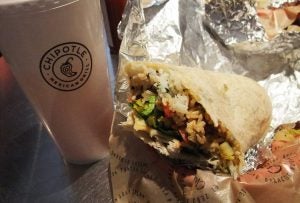Chipotle Mexican Grill — the fast-food restaurant that has long ruffled the feathers of many in the agricultural industry — is premiering its first-ever Super Bowl commercial, during the second quarter of Super Bowl LV between the Kansas City Chiefs and Tampa Bay Buccaneers. The ad spot, titled “Can a Burrito Change the World?,” features a young boy rhetorically asking that question while touting Chipotle’s Food with Integrity marketing and making claims about the impacts those standards can have on carbon emissions, water conservation, and local growers.
To further sweeten its Super Bowl stance, Chipotle said it will donate $1 from every delivery order on game day (Feb. 7) to the National Young Farmers Coalition and is pledging $5 million over the next five years to help remove barriers and enable the next generation of farmers and ranchers to succeed. These are extremely positive steps that can translate into tangible success for the future of agriculture. These efforts to bolster the farming community dovetail with Chipotle’s recently launched Cultivate the Future of Farming campaign to raise awareness of the hardships being experienced in agriculture, while then offering thoughts and seed grants in order to reverse it.
However, as has been asked often in recent months, the question is whether Chipotle is doing too little to late to help today’s farmers. For years, the company has criticized and undermined farmers and ranchers, bullied them for using modern breeding techniques and for treating their animals with medications. The video short The Scarecrow, which depicted a dystopian world of food production, was Chipotle’s first leap into the rabbit hole. And then in 2014, Chipotle produced the inflammatory Farmed and Dangerous video, which tore into the very industry that produces the stuff that goes into their tortillas.
One article described the fast-food restaurant’s approach as such: “Chipotle’s new ag-vertisment is akin to pouring gas all over a dry forest, throwing in a match, and then a few years later wanting to be perceived as tree friendly by planting a few saplings.”
Some of the best approaches to carbon sequestration and water conservation include the food-production techniques that Chipotle demonizes — things like the adoption of drought-tolerant genetically engineered seeds and biotech crops that require fewer protection applications (or none at all), thus reducing tractor and fuel use. These “GMOs” that Chipotle stands against also better allow for no-till agriculture, further helping the environment and the sustainability of farming and ranching as a whole.
So, why does Chipotle’s actions often run afoul of the practicality of agriculture advancements, and what does the Food with Integrity statement mean?
The company says on its website that this manifests as:
- Committing to local and organic produce
- Using only responsibly raised meat with some of the highest animal welfare standards
- Not using hormones in its meat
Despite it’s stance against GMOs and promotion of organic foods, Chipotle has continued to sell high-margin products with genetically engineered ingredients, such as sodas and cheese, in its restaurants.

There are ways to be proud of what you do without needlessly sinking others in agriculture. Chipotle doesn’t often approach its marketing in those ways, though.
“The company believes the global pandemic has shifted consumer behavior to lean towards a community-focused society, further igniting a passion inside of many for making purchasing decisions that drive difference in the world around them,” the company said in a news release accompanying the launch of the ad. “With this spot as part of a series of brand actions, Chipotle is shedding light on how greater awareness of where food comes from and how it is grown can not only help everyone, but also begin to reverse an agricultural industry crisis, which has lost 40x more farmers than it has gained over the last decade.
“Last year, the brand spent more than $300 million in food premiums to purchase supplies that are responsibly sourced, humanely raised and often locally grown,” the news release said.
Chipotle itself has been starved for good PR in recent years, after numerous food-safety issues have cropped up in its restaurants, leading, in part, to a 2020 lawsuit in which the company was ordered to pay $25 million to resolve criminal charges related to foodborne illness outbreaks that sickened more than 1,100 people between 2015 and 2018.
People in agriculture proceed with caution because “Chipotle’s decisions to fight agriculture or embrace it are not borne from altruism,” said Kevin Folta. “Public-facing corporate positions are spawned from focus groups and surveys, as a multinational, billion dollar food empire certainly has its greasy finger on the consumer’s pulse. Ad campaigns play into reinforcing the consumer’s perceptions and identity, showing that Big Burrito aligns with their values.”
So yes, while Chipotle spearheads some very positive and noble causes — in addition to this new effort to support young farmers, the company has also sponsored virtual farmers markets and food waste programs — there is a lot of work to be done to mend the fences it broke and to really elevate itself to embracing the full sustainability of modern agriculture.


